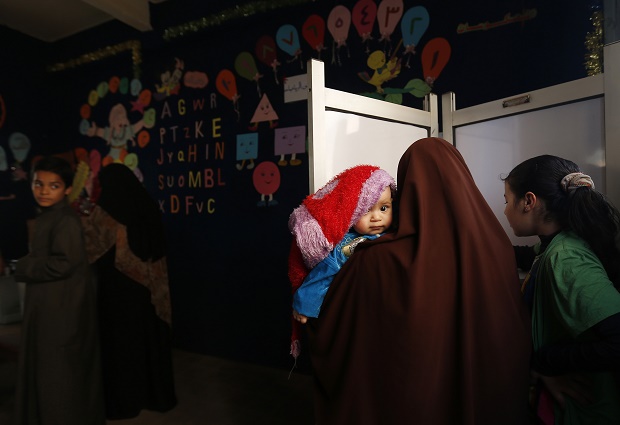
A woman holds her child as she marks a ballot inside a polling station during the second phase of the parliamentary election in Menoufiya, 60 kilometers (40 miles) north of Cairo, Egypt, Monday, Nov. 23, 2015. AP
CAIRO — Despite a half-day off the Egyptian government granted its employees on Monday, a low voter turnout continued to plague the country’s parliamentary elections on the final day of the second stage in the balloting.
Egypt has not had a parliament since a court ruling dissolved its Islamist-dominated legislature in 2012. The elections come against a backdrop of growing security and economic concerns following the crash of a Russian airliner in Egypt’s Sinai Peninsula that killed all 224 people on board last month.
Russia has said that a bomb had downed the plane and a local Islamic State affiliate has claimed responsibility for the attack, dealing a severe blow to Egypt’s vital tourism sector.
Final results are scheduled to be announced in December and the 596-seat chamber is expected to hold its inaugural session later next month. The first phase of voting took place last month in 14 provinces with a turnout of nearly 27 percent. The second, due to end Monday, is being held in the other 14 provinces and the capital, Cairo.
Voter turnout has not been this low since the 2011 ouster of autocrat Hosni Mubarak in a popular uprising, except for the vote for a toothless upper chamber in 2012.
Political apathy has been on the rise since President Abdel-Fattah el-Sissi, who was then military chief, led the 2013 army overthrow of Egypt’s first freely elected leader, the Islamist Mohammed Morsi, amid a wave of mass protests against his rule. El-Sissi was elected last year.
READ: Egyptians trickle to polls in parliamentary runoffs
Associated Press reporters who toured at least 18 polling centers across Egypt Sunday and Monday noted a slight increase in activity, especially outside the capital, in comparison to last month’s round. But the turnout still stood in sharp contrast to the long lines that defined the first elections held after the 2011 uprising and before Morsi’s ouster, all of which were swept by Morsi’s Muslim Brotherhood.
In some cases in this election, campaigners and security forces outnumbered voters outside polling centers in Cairo, where several journalists, covering the voters trickle, complained of police obstruction.
Since Morsi’s ouster, the authorities have cracked down on the now-banned Islamist group, jailing thousands and killing hundreds in street clashes with security forces. Young liberal and pro-democracy activists who spearheaded the 2011 uprising have also been swept up in the crackdown, with authorities detaining dozens of them, mostly for breaching a law adopted in 2013 that effectively bans street demonstrations. As a result, the Brotherhood, young pro-democracy and left-wing activists have boycotted the elections.
As in the previous round of elections, most of those casting ballots were women or elderly people.
“I didn’t see a single youth come out to vote,” said campaigner Mohamed Zeinhom in Cairo’s Sayeda Zeinab neighborhood. The only young person at the scene was Zeinhom’s daughter, Hagar, whom he said he had to all but physically drag to the center to bring him tea and support his employer.
“I didn’t want to vote,” said the 20-year-old Hagar, a law student. “We know better that to expect something from the government. It’s all empty talk.”
Many campaigners and voters across Cairo also spoke of rampant vote-buying, mainly by candidates that once belonged to Mubarak’s now-defunct National Democratic Party.
“We can’t do anything at all about it and if you ask the police to intervene, they say: ‘As long as it is outside the center, we can’t do anything about it’,” said Ramy Adel, another campaigner in the Sayeda Zeinab neighborhood.
A number of policemen at several centers shrugged off the vote-buying allegations, dismissing the claims without elaborating.
“Parliaments and officials come and go and Egypt is still the same. Nothing ever gets better,” said homemaker Engy Fawzy as she stood outside another Sayeda Zeinab polling station. “The candidates didn’t make an effort to introduce themselves. Why would you take time out of your day to vote for someone you don’t know?”
Yet Fawzy, a mother-of-four, said she voted only because “one can only do his part and hope the government does its.”
The upcoming parliament is widely expected to support el-Sissi, who is struggling to revive the economy, crush an Islamist insurgency — especially in the Sinai Peninsula where the Russian jetliner crashed and where an Islamic State affiliate is based — and play an assertive political and military role in a turbulent Middle East. Such a chamber would harken back to the Mubarak era, when elections during his 29-year rule were rigged or manipulated to give his NDP an overwhelming majority in what amounted to rubber-stamp legislatures.